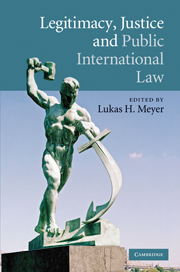Book contents
- Frontmatter
- Contents
- List of contributors
- Acknowledgements
- Introduction: Legitimacy, justice and public international law. Three perspectives on the debate
- 1 The legitimacy of global governance institutions
- 2 Institutionalising global demoi-cracy
- 3 The responsibilities and legitimacy of economic international institutions
- 4 Do international organisations play favourites? An impartialist account
- 5 ‘Victors’ justice'? Historic injustice and the legitimacy of international law
- 6 International law and global justice
- 7 Global justice: Problems of a cosmopolitan account
- 8 The responsibility to protect human rights
- 9 The threat of violence and of new military force as a challenge to international public law
- 10 Forcing a people to be free
- Index
- References
3 - The responsibilities and legitimacy of economic international institutions
Published online by Cambridge University Press: 03 May 2010
- Frontmatter
- Contents
- List of contributors
- Acknowledgements
- Introduction: Legitimacy, justice and public international law. Three perspectives on the debate
- 1 The legitimacy of global governance institutions
- 2 Institutionalising global demoi-cracy
- 3 The responsibilities and legitimacy of economic international institutions
- 4 Do international organisations play favourites? An impartialist account
- 5 ‘Victors’ justice'? Historic injustice and the legitimacy of international law
- 6 International law and global justice
- 7 Global justice: Problems of a cosmopolitan account
- 8 The responsibility to protect human rights
- 9 The threat of violence and of new military force as a challenge to international public law
- 10 Forcing a people to be free
- Index
- References
Summary
Recently much has been written about the ethical issues surrounding global politics. There has, for example, been a considerable literature on global ideals of distributive justice. However, amongst all this, very little has been written by political theorists on some of the most significant international institutions, such as the International Monetary Fund (IMF), the World Bank and the World Trade Organisation (WTO). Many discussions of global distributive justice tend to regard states as the central duty-bearers and assume that the pursuit of global justice requires, for example, an increase in states' overseas development budgets. There has, of course, been a considerable literature on some international institutions. Writers such as Daniele Archibugi and David Held have defended what they term a ‘cosmopolitan democracy’ where this calls for the democratisation of global political institutions. However, the focus of this perspective tends to be on reforming the United Nations.
My aim in this chapter is to provide a provisional and tentative analysis of the normative nature of international economic institutions, such as the IMF, World Bank and the WTO. I shall make particular reference to these three institutions, in part, because they play an important role and, in part, to simplify the analysis. However, it is not assumed that these are the only international economic institutions of import nor is it assumed that the analyses that follow cannot be applied to other institutions. To this we should also add that the chapter is exploratory in nature.
- Type
- Chapter
- Information
- Legitimacy, Justice and Public International Law , pp. 92 - 122Publisher: Cambridge University PressPrint publication year: 2009
References
- 10
- Cited by

